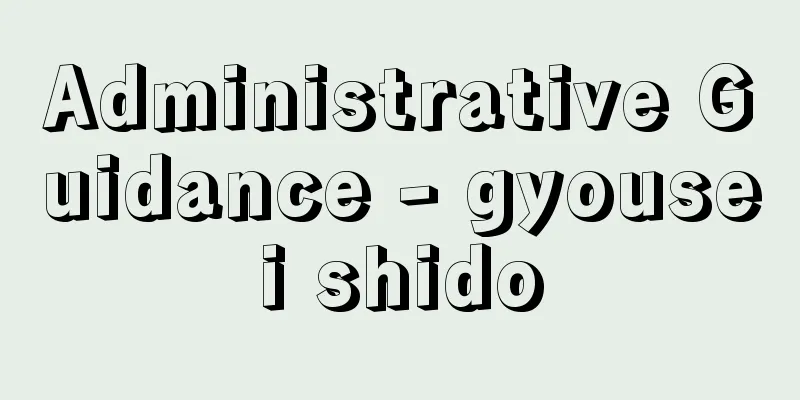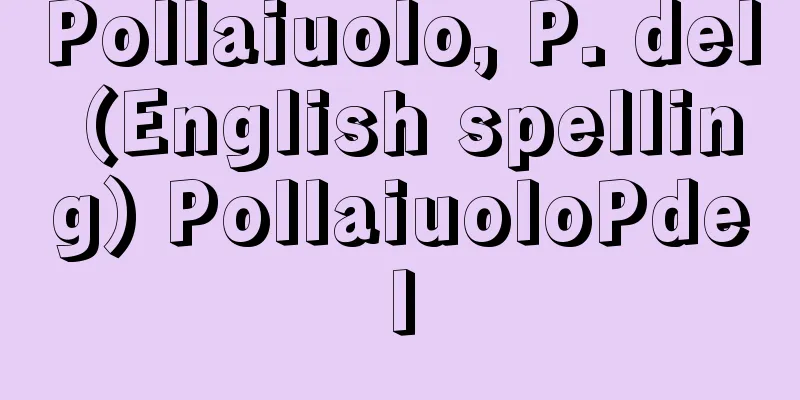Administrative Guidance - gyousei shido

|
It is a term used in administrative law, and the definition has been debated in the past, but the Administrative Procedure Act (Act No. 88 of 1993), which came into force in 1994, defines it as "guidance, recommendation, advice, and other actions that do not constitute dispositions, in which an administrative agency requests a specific person to take or refrain from taking a certain action in order to achieve a certain administrative purpose within the scope of its duties or affairs under its jurisdiction" (Article 2, Paragraph 6 of the same Act). In itself, it is an action that has no legal binding force (coercive force). Adverse dispositions that impose obligations or restrict rights are not permitted unless they have a legal basis, but administrative guidance may or may not have a legal basis. Unlike administrative actions, whether or not to comply with administrative guidance is left to the discretion of the other party (voluntary compliance), and in principle, criminal penalties and administrative coercion are not applied, but there are also cases where it is stipulated that failure to comply with administrative guidance will result in administrative disposition (Article 65 of the Real Estate Transaction Business Law, Article 28 of the Construction Business Law, etc.). Furthermore, administrative guidance itself is a de facto act and does not produce legal effects. There are three types of administrative guidance: supportive administrative guidance (e.g., agricultural improvement and extension guidance), restrictive administrative guidance that restricts the rights and freedoms of the other party, and accommodative administrative guidance that aims to reconcile the interests of conflicting parties (e.g., accommodating discussions between an apartment construction company and nearby residents). Administrative guidance has become widely known abroad as a feature of Japanese administration since 1965, when the Ministry of International Trade and Industry (currently the Ministry of Economy, Trade and Industry) instructed Sumitomo Metal Industries (currently Nippon Steel & Sumitomo Metal) to reduce crude steel production. It is used in a wide range of areas, including the elimination of defective medicines, price control, healthy urban development, golf course regulations, waste disposal site regulations, restrictions on the opening and location of large retail stores (supermarkets and department stores), and the control of overproduction. Reasons for the use of administrative guidance include the convenience of the administration, since it does not require cumbersome procedures and is rarely contested, the need to respond urgently to legal deficiencies, the national character of Japanese people who dislike authority, prefer solutions by agreement, and do not resist administrative authority to the end. Although administrative guidance is nominally a voluntary measure, it is effective in reality because it is reasonably implemented to a certain extent, and sanctions such as public announcement of violations, withholding of water supply, withholding of building confirmation, and stopping various subsidies and loans are available. However, using these sanctions other than public disclosure exceeds the limits of guidance and is generally illegal. The Administrative Procedure Act has established a clear regulatory system on this matter. It prohibits the principle of prohibiting administrative guidance coercion, prohibiting disadvantageous treatment (Article 32), and also prohibits the suppression of applications for licenses and permits against the applicant's will, threatening that approval will not be granted unless administrative guidance is followed (Article 33). In cases where it is not possible to reject an application, it is also prohibited to demand that the application be withdrawn by threatening that approval will not be granted unless the consent of the residents is obtained (Article 34). In addition, the person in charge of administrative guidance must clearly indicate to the other party the purpose and content of the administrative guidance and the person responsible (Article 35, paragraph 1), and if requested, must provide a written document containing these items unless there is a special obstacle (Article 35, paragraph 2). Administrative guidance is often given verbally, but in cases where administrative guidance is forceful, the administrative agency may stop the forceful administrative guidance simply by requesting the submission of a written document. In reality, administrative guidance has no coercive power and is not legally required to be followed, so even if illegal administrative guidance is received, it is not possible to file a lawsuit to set it aside, but there is a strong argument that lawsuits to set it aside should be allowed in cases where the administrative guidance is a de facto coercive measure that leaves no other option than to follow it, or where it is a prerequisite for the next disposition (instructions, etc.) or public disclosure. There are also quite a few precedents in which state compensation is allowed for illegal administrative guidance. Furthermore, there is a strong view that publishing the information, especially on a website, is illegal because it imposes excessive sanctions for minor violations. [Yasuhito Abe] [Reference item] | |Source: Shogakukan Encyclopedia Nipponica About Encyclopedia Nipponica Information | Legend |
|
行政法学上の用語で、法令上は指導、助言、勧告、勧奨、指示などの語が用いられ、従来、その定義に議論があったが、1994年(平成6)に施行された行政手続法(平成5年法律第88号)は、「行政機関がその任務又は所掌事務の範囲内において一定の行政目的を実現するため特定の者に一定の作為又は不作為を求める指導、勧告、助言その他の行為であって処分に該当しないものをいう」(同法2条6号)と定義した。それ自体としては法的拘束力(強制力)のない行為である。 義務を課したり権利を制限したりする不利益処分なら、法律の根拠がなければ許されないが、行政指導は、法令上の根拠規定がある場合も、ない場合もある。行政行為と異なり、行政指導に従うかどうかは相手方の任意にゆだねられ(服従の任意性)、刑罰や行政強制の適用はないのが原則であるが、行政指導に従わないと、次には行政処分を受ける旨規定されている例(宅地建物取引業法65条、建設業法28条など)もある。また、行政指導自体は事実行為であり、法的効果を生じない。 行政指導には助成的行政指導(例、農業改良普及指導)、相手方の権利や自由を規制する規制的行政指導、対立する当事者間の利害調整を目的とした調整的行政指導(例、マンション建設業者と付近住民との話し合いの調整)の3種がある。 行政指導は、1965年(昭和40)に通産省(現、経済産業省)が住友金属工業(現、新日鉄住金)に対してした粗鋼の減産指導以来、日本の行政の特色として諸外国にも広く知られるようになった。欠陥医薬品排除、物価抑制、健全な街づくり、ゴルフ場規制、廃棄物処分場規制、大規模小売店舗(スーパー、百貨店)の出店・立地抑制、過剰生産の抑制など、幅広い領域で用いられている。行政指導が活用される理由としては、めんどうな手続を要せず、争われることも少ないから行政側に便宜であること、法律の不備に対して緊急に対応する必要があること、権力を嫌い、合意による解決を好み、また、行政の権威にとことん抵抗しない国民的体質があること、などが指摘される。行政指導はたてまえ上は任意手段であるが、ある程度は合理的な内容をもつうえに、違反に対し公表、水道供給の保留、建築確認の保留、各種補助金・融資のストップなどの制裁手段が用意されているため、現実には実効性をもつ。 しかし、公表以外のこれらの制裁手段を用いることは、指導の限界を越え、一般に違法である。行政手続法は、これについて明確な規制制度をおいた。行政指導強制禁止の原則、不利益取扱い禁止(32条)、許認可の申請を、申請者の意思に反して握りつぶすこと、行政指導に従わなければ許可しないなどと脅すことも禁止(33条)、申請に対し拒否処分をなしえない場合に、住民の同意を取ってこなければ不許可にすると言って、取り下げを求めることも禁止(34条)される。また、行政指導の担当者は、その相手方に対して、当該行政指導の趣旨および内容ならびに責任者を明確に示さなければならず(35条1項)、求められれば、特別な支障がない限り、これらの事項を記載した書面を交付しなければならない(35条2項)。行政指導は口頭でなされることが多いが、強引な行政指導を受けた場合は、書面の交付を求めるだけで、行政機関が強引な行政指導をやめることもある。 本来、行政指導には強制力がなく、法的には従う必要がないため、違法な行政指導を受けた場合でも取消訴訟等を起こすことはできないが、従う以外に方法がないような事実上の強制手段である場合や、次の処分(指示など)や公表の前提となる場合などでは、取消訴訟等を認めるべきだとの説も有力である。また、行政指導の違法を理由に国家賠償を認める判例は少なくない。 なお、公表も、特にホームページでの公表は、少々の違反に過大な制裁を課すことになるので違法との見方が有力である。 [阿部泰隆] [参照項目] | |出典 小学館 日本大百科全書(ニッポニカ)日本大百科全書(ニッポニカ)について 情報 | 凡例 |
<<: Concentration camp - Konzentrationslager (English spelling) German
>>: Administrative examples - Gyosei Jitsurei
Recommend
Iberis umbellata - Iberis umbellata
...The seeds are sometimes used to make mustard, ...
sousedská (English spelling) sousedska
…A Central European republic that existed from 19...
Emperor Wen
The fifth emperor of the Western Han dynasty of C...
Wombat - Wombat (English spelling)
A general term for animals belonging to the order...
Causalgie (English spelling) (German) Kausalgie
Scorching Hot Heat Ouch. Peripheral Mashou Severe...
Allethrin - Aresurin
...The insecticidal power of pyrethrin I and II i...
Quercus glauca (English spelling)
…[Motoji Okamoto] [Aya Nitta]. … *Some of the ter...
Tibet Autonomous Region - Tibet (English spelling)
Its Chinese name is Xitsang (Xizang). Its abbrevia...
Hawran (English spelling)
…South of Mount Hermon lies the Golan Heights (av...
Feuermann
A cellist from Austria. Along with Casals, he is o...
Gardoni G. - Gardoni
…Furthermore, Molnár, a writer of urbanism, achie...
CSTP
…The United Nations' Intergovernmental Commit...
《Sixteenth Night》 - Izayoi
…In 1891, he became the second Taibei, and in 189...
Berthe Morisot
A French female painter. Born into a distinguishe...
Pierrot - Pierrot (English spelling) French
A type of Western clown. Its prototype is the slo...









